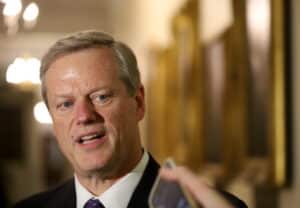Gov. Charlie Baker last week said he was “disappointed” with many of the core elements of Speaker Robert DeLeo’s transportation funding tax package, raising the stakes for next week’s debate.
Baker, who has already said he opposes increasing the gas tax, said he also does not support increasing the corporate minimum excise tax, which is currently set at $456.
When taken together, the governor’s opposition to tax increases in the House bill could endanger at least half – or $300 million – of the House’s revenue plan, which tops out at $612 million, unless supporters can amass the two-thirds vote that would be needed to override any veto.
House leaders on Wednesday rolled out a revenue package that included a 5-cent increase in the gas tax, a 9-cent increase in the tax on diesel fuel, a new $150 million tiered corporate minimum tax structure that tops out at $150,000 for the largest companies, and new fees on Uber and Lyft rides.
Transportation Committee Co-Chair Rep. William Straus said that without new revenue like that proposed by House Democrats, Baker’s $18 billion transportation bond bill would be unaffordable. House leadership, instead, will put a $14.5 billion bond bill on the floor next Thursday.
“We’re going to be honest with the public and say if you want to come anywhere near $18 billion or more in capital projects, they have to be paid for,” Straus told reporters Wednesday.
Asked if his plan was affordable without tax hikes, Baker said, “Absolutely.” Senate leaders have also defended the level of spending in the governor’s bill as appropriate.
“I don’t believe you need to raise taxes to fund transportation at this point in time,” Baker said.
Baker has, however, put forward his own plan to raise money through higher fees on Uber and Lyft rides, and said he was “disappointed” that despite including $145 million in new TNC fees in their plan House leaders have, so far, suggested less funding for the MBTA than the governor.
Baker’s budget for next year included $200 million for the MBTA, in addition to fares and dedicated sales tax revenues that already flow to the agency. The House’s tax bill created a new $27 million fund for the T, but leaders only committed to a $160 million operational subsidy for the MBTA. That total could climb when House Ways and Means Chairman Aaron Michlewitz files his budget in April.
Baker has long said he opposed raising the gas tax, but reiterated Thursday that he believes it “doesn’t do anything for climate and it doesn’t do anything to change behavior.”
The governor said the regional cap-and-trade program for emissions, known as the Transportation Climate Initiative, would be preferable. DeLeo said Wednesday he supports TCI but considers its prospects “iffy,” given the concerns expressed by other states.
Rep. Ruth Balser, a Newton Democrat and co-chair of the Committee on Elder Affairs, said the House’s goal was to raise the revenue necessary to respond to the concerns of the people they represent. She said she would “be hopeful that there would be that level of support” to override any possible veto from Baker.
“TCI may be a great approach. We just have no reason to assume it’s going to happen and we in the House couldn’t wait. The people of the state are crying out,” Balser said.
Repeating a word used frequently by Baker, Balser said she was also disappointed that Baker would oppose asking businesses that do over a $1 million in sales each year to contribute more.
“It’s disappointing that the governor doesn’t want employers to contribute their fair share. It’s certainly in the interest of the employers that their workers get to work on time,” Balser said.







